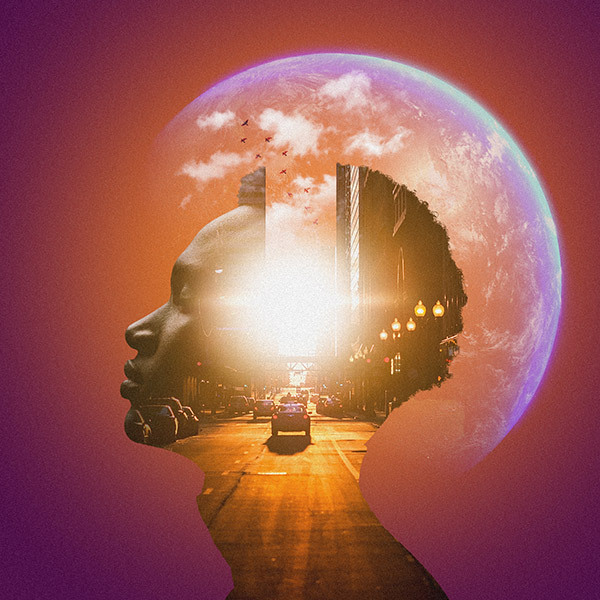March 16, 2023
Notes on The Walkers
By Daniel Bernard Roumain
Upon a suggestion from the director, Yuval Sharon, and an invitation from the singer, Renée Fleming, I was asked to compose the music for a new opera, which was to be a part of a trilogy. My work began during the summer of 2020, just after the start of the pandemic, as we were all faced with new realities and consequences for our work and actions. I had met the actor and writer Anna Deavere Smith earlier in New York City, and our conversations were broad and wide and brimming with ideas centered on storytelling, community, and a longing for understanding and change.
The libretto for The Walkers is a brilliantly complex story whose text oscillates between transcribed interviews of real people in Chicago and the voices of Anna's composite characters. It's a potent mix of history, humor, poetry, and hope — all cast on a quest for freedom. For me, great words always suggest great music, and the music was always there in the rhythm of Anna's words and magical ability to report and inquire and conjure up an array of feelings that allowed for a musical score that's big and raucous at times, and soft and intimate in an instant.
The music was also responding to the innovative design ideas of Yuval, where he was always in search of new ways of telling stories that allowed for inquiry and empathy, and that demanded as much from the score. Without Yuval and Anna challenging me to match and marry their ideas with my music, it's clear that this score would have been something far less appealing. I remain in their debt.
Any operatic work is an investment. It's an act of trust. It's quite literally a show of faith. Collaborating with Lyric Opera of Chicago — the staff, production crew, musicians, artistic leadership, and, of course, the audience — has profoundly changed me as a human being and as a Black, Haitian-American composer. The work they are doing, and their commitment to the creative canon of past, present, and future work, is peerless in an industry slow to change and sometimes reluctant to embrace it. Not here!
I was born in Skokie, Illinois, just miles from this opera house. I feel at home here. I feel welcomed and seen and heard and safe, and most of all, loved here. I was able to find a creative freedom that allowed me to be my full, creative self. I didn't have to compromise. I didn't have to hold back. I was held forward.

The Walkers takes place in current-day Chicago.
By Anna Deavere Smith
For several decades now, I've been creating theater based on verbatim excerpts of interviews from real people about social issues — sometimes hundreds of interviews. Out of these excerpts I wrote one-person shows in which I played all the parts. At the time this work hit the scene, it was considered sui generis, and I was credited with creating a new form of theater. And now I have switched gears to work in other forms. Renée Fleming saw the last play that I created and performed in that style, Notes From The Field. That play focused on the school-to-prison pipeline. To write it, I interviewed 250 people in schools, juvenile halls, courthouses, on the Yurok Reservation in Northern California, and in beat-up city neighborhoods. We even went up and down "the corridor of shame" in South Carolina, so called because the schools are so bad. Having seen that play, Ms. Fleming invited me to write a libretto about gun violence in Chicago.
In fact, among the first people I interviewed for Notes From The Field was Arne Duncan, then the U. S. Secretary of Education under President Obama. During the course of considering who in Chicago I would interview, I thought of Arne's bold move—to radically reduce gun violence by working with the shooters themselves. He founded Chicago CRED (Create Real Economic Destiny), which provides wraparound services to support individuals who want to give it a go towards changing their lives. CRED provides jobs, counseling, educational support, job training, mental health therapy — and the many different kinds of things that the participants and their families need. I contacted Arne, and he opened the doors of his organization, providing a liaison who found individuals I could interview. Those doors turned out to be virtual; due to the pandemic, I was unable to travel to Chicago as planned, and the interviews were conducted on Zoom.
Arne told me that people praise him for giving these kids a second chance. He reminds us that in fact CRED is the first chance because many of the participants really did not have a choice to begin with.
I spoke with several participants, some of whom had been incarcerated because they were involved in gun violence. Those moments when an individual first leaves prison or juvenile hall are precarious. I was struck by the dedication and positive outlook of the counselors, staff, and outreach workers I interviewed. Some were people who had "status" in the community because of things they themselves had been through or because of the status held by their parents or family members — for example being the child of a former gang "chief." I met a wide variety of people and heard many stories, some of which are represented in the libretto that I eventually wrote.
Some, like the character of Preacher Man, are composites. I am especially grateful to Yasmine Miller, a mother whose infant was killed by a bullet that seared the back window of her car, as she was heading to the laundromat — a tragedy that many Chicagoans will remember. As a departure from years of writing plays based on interviews, a lot of the language in the libretto I created from scratch out of my imagination.
The title, The Walkers, refers to the people who walk beside people who are struggling without giving up on them, no matter how dire the circumstances. To actually walk with those who are struggling without giving up requires extraordinary compassion and will. As Arne says, "you cannot do this work from downtown." He calmly acknowledges that personal safety can be at stake. Arne was in a neighborhood where that was in fact the case when a young man approached and asked, "Man, what are you doing here?" Arne's answer: "I'm here because you're here." That is a powerful idea, and it takes me to the philosopher, Martin Buber. Buber suggests that we have a choice as human beings, to have an "I-Thou" relationship with fellow humans, or "I-It" relationships. I-Thou relationships allow us to be human to human. I–It relegates one of us to the status of a thing. The Walkers is a call for an extra dose of "I–Thou-ness" in society.

